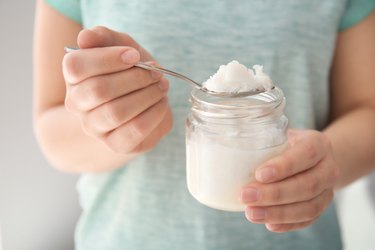
Given the many health claims surrounding coconut oil, you may be searching for ways to incorporate the plant fat into your diet. Frying with coconut oil is possible. But for high-temperature frying, use refined coconut oil.
Tip
Yes, coconut oil is good for frying. However, when you fry foods at high temperatures always use refined coconut oil, which has a higher smoke point than virgin coconut oil.
Video of the Day
Coconut Oil Smoke Point
When considering coconut oil for high temperature cooking, take its smoke point into consideration. The smoke point refers to the temperature at which the fat starts to break down and burn, which not only fills your kitchen with smoke, but also alters the flavor of the oil and produces unhealthy compounds called free radicals.
Video of the Day
When frying, you need to select an oil that has a high smoke point. According to the USDA, deep frying requires a fat that has a smoke point that can reach temperatures greater than 400 degrees Fahrenheit. With coconut oil, the smoke point depends on the type of coconut oil you're using, says Harvard T.H. Chan School of Public Health.
Virgin coconut oil, also called expeller-pressed or cold-pressed, has a smoke point of 350 F, while refined coconut oil has a smoke point of 400 to 450 F. When deep frying with coconut oil, you're better off with the refined version. Extra virgin olive oil, by comparison, has a smoke point of 350 to 410 F, according to the North American Olive Oil Association.
Though the refined version is a better choice for frying at high temperatures, you won't get any of the distinct coconut taste because it's processed to be odorless and tasteless. If you're more interested in using coconut oil to add flavor to your food, consider a quick saute over medium heat with virgin coconut oil instead of frying.
Read more: Refined vs. Unrefined Coconut Oil
Is Coconut Oil Healthy?
With claims that it curbs the appetite, melts belly fat and reverses Alzheimer's disease, you're not alone if you consider coconut oil a healthy fat. However, the evidence to back these health claims is thin, according to the Academy of Nutrition and Dietetics.
Unlike other plant oils, coconut oil is solid at room temperature. This is because 80 to 90 percent of the fat in coconut oil is saturated fat, notes Harvard T.H. Chan School of Public Health. Saturated fat is the unhealthy fat that raises blood cholesterol levels and increases your risk of heart disease.
However, proponents of coconut oil claim that the saturated fats in the plant oil (medium-chain triglycerides) aren't as harmful as the saturated fats in red meat and high-fat dairy. They assert that medium-chain triglycerides actually lower cholesterol. Unfortunately, the current scientific evidence seems to refute these health claims.
An April 2016 review study published in Nutrition Reviews found that coconut oil was more likely to raise cholesterol when compared to other vegetable oils. However, the researchers noted that coconut oil didn't seem to raise cholesterol to the same extent as butter.
For perspective, the USDA says one tablespoon of coconut oil has 121 calories, 13.5 grams of total fat and 11 grams of saturated fat. The same serving of butter has 100 calories, 11 grams of total fat and 7 grams of saturated fat.
Though the health claims surrounding coconut oil may be exaggerated, you don't have to exclude the flavorful oil from your diet. You should use the oil sparingly, however. The USDA's 2015-2020 Dietary Guidelines for Americans Executive Summary recommends you limit your intake of saturated fat to no more than 10 percent of total calories, or about 22 grams on a 2,000-calorie diet.
Read more: How Much Coconut Oil Should I Eat Daily?
Healthiest Oil for Pan Frying
Coconut oil may not be the best choice when it comes to health, but you have many other healthy oil options. When it comes to selecting a cooking oil, the American Heart Association recommends you go for nontropical vegetable oils rich in monounsaturated and polyunsaturated fats.
Of course, you also need to take smoke point into consideration when looking for the healthiest oil for pan frying. According to the USDA, healthy oils with smoke points ranging from 400 to 450F include:
- Peanut oil
- Soy oil
- Safflower oil
- Canola oil
- Sunflower oil
- Olive oil
As when you're frying with coconut oil, choose the refined form of these oils for pan frying. Manufacturers process these oils to remove impurities that prolong shelf life and increase smoke point, according to the American Council on Exercise.
However, the refining process also decreases the natural flavor of the oil and removes antioxidants and polyphenols. For flavor and nutrition, consider cooking with a less refined oil, such as extra virgin olive oil, and sauteing over medium heat instead of pan frying at a high temperature.
- University of Rochester Medical Center: "Cooking Oils: Which One, When and Why?"
- USDA: "Deep Fat Frying and Food Safety"
- Harvard T.H. Chan School of Public Health: "Coconut Oil"
- Academy of Nutrition and Dietetics: "The Facts About Coconut Oil"
- U.S. National Library of Medicine: "Facts About Saturated Fat"
- Mayo Clinic: "Don't Get Tricked by These 3 Heart-Health Myths"
- Nutrition Reviews: "Coconut Oil Consumption and Cardiovascular Risk Factors in Humans"
- USDA: FoodData Central: "Coconut Oil"
- USDA: FoodData Central: "Butter, Stick, Unsalted"
- Dietary Guidelines for Americans 2015-2020: "Executive Summary"
- American Heart Association: "Healthy Cooking Oils"
- American Council on Exercise: "Are You Using the Right Cooking Oils?"
- Penn State Extension: "Oil: What's Cooking?"
- North American Olive Oil Association: "Olive Oil Smoke Point"